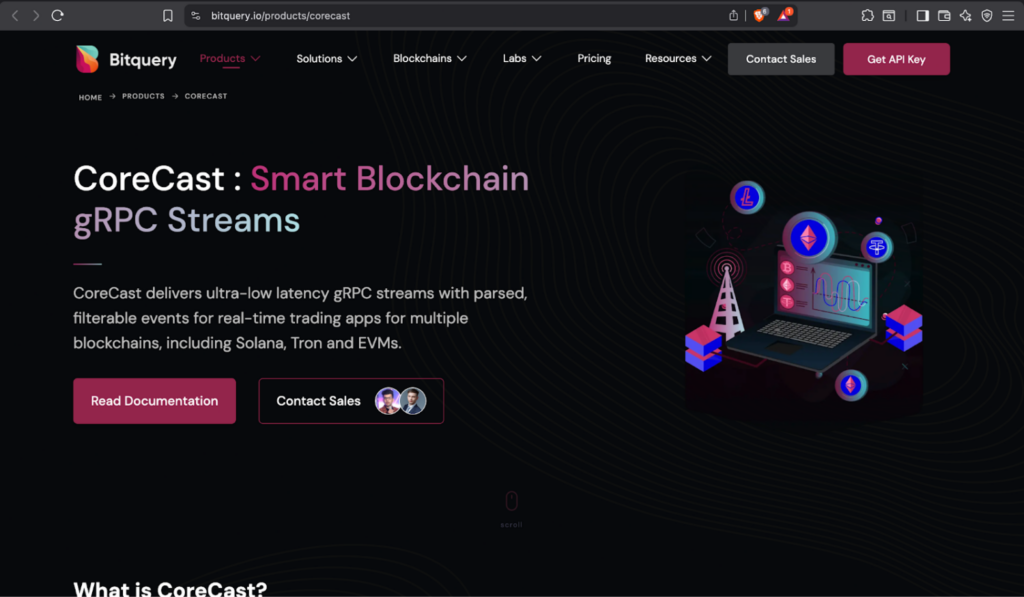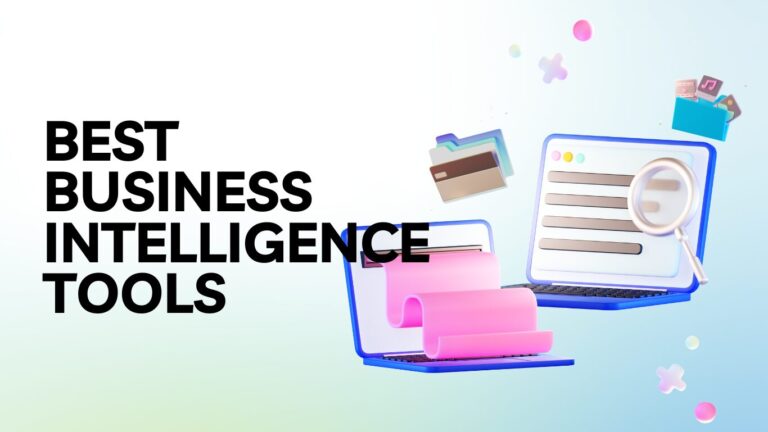Solana’s high-performance blockchain is one of the most dynamic ecosystems in Web3 today, capable of processing over 100,000 transactions per second (TPS) in stress tests and consistently handling 1,000–2,000 TPS normally, all while maintaining minimal transaction fees. But this speed also poses a major challenge: how do you efficiently access and process Solana data in real time?
For developers building analytics dashboards, trading bots, prediction markets, or monitoring tools, getting structured, timely, and accurate blockchain data is essential. That’s where gRPC comes in, a modern, efficient way to stream blockchain data directly into your application.
In this article, we’ll compare four leading providers offering Solana data access via gRPC or similar services: Bitquery, Helius, QuickNode, and Shyft. We’ll look at their features, performance, developer experience, and ideal use cases so you can decide which one best fits your project.
Table of Contents
What Is Solana gRPC and Why It Matters
Before diving into the comparisons, it’s worth understanding why gRPC is essential for blockchain data.
gRPC is an open-source remote procedure call framework developed by Google. It allows applications to communicate faster and more efficiently than traditional REST or WebSocket APIs by using Protocol Buffers (Protobufs). This binary serialization format makes data exchange lightweight and structured.
Here’s what that means for developers working on Solana:
- Low Latency: Real-time updates delivered almost instantly.
- Bidirectional Streaming: Data can flow continuously between the client and server.
- Smaller Payloads: Binary data is faster to send and parse than JSON.
- Strong Typing: Protobuf schemas ensure consistent data types across services.
- Efficient Filtering: Queries can target only relevant data, reducing bandwidth usage.
In other words, gRPC is the backbone of the next generation of blockchain data infrastructure, enabling real-time analytics, DEX monitors, NFT alerts, and complex event-driven systems.
Bitquery: Smart Streams and Context-Aware Data
Among the four providers, Bitquery stands out for its dedicated focus on enriched, real-time blockchain data through its Smart Streams and Solana gRPC service.
Unlike standard APIs that only return raw on-chain data, Bitquery’s Solana gRPC and streaming solutions add context and structure by decoding events, identifying transaction types, and providing token metadata.

The result is a continuous stream of data that is easy to consume and immediately useful to applications that rely on accurate, timely information.
What Makes Bitquery’s Solana gRPC Different
Bitquery’s Smart gRPC Streams are not simple transaction feeds. They are context-aware pipelines organized into specific data topics, including:
- Transfers: Token and SOL movement events that allow developers to monitor wallet activity in real time.
- DEX Trades: Information about swaps, liquidity changes, and market activity on Solana decentralized exchanges.
- Token Balances: Real-time updates on Solana token holdings and balance changes.
- Account Updates: Changes to account states relevant to developers building dApps or monitoring contract interactions.
- Transaction Metadata: Details such as signatures, instruction sets, and fee information, providing complete visibility into every event.
This topic-based structure allows developers to subscribe only to the data that matters most to their application, rather than process entire blocks or ledgers. It greatly simplifies data ingestion, improves performance, and reduces bandwidth consumption.
Bitquery uses Protocol Buffers (Protobuf) to structure this information. Developers receive data as compact, strongly typed messages via gRPC or Kafka, ensuring reliability and low latency.
Key Strengths of Bitquery
Here are some of the key strengths of BitQuerry:
- Real-time performance: Bitquery delivers near-instant Solana updates, typically within one second of confirmation.
- Server-side filtering: Developers can filter by wallet address, token mint, program ID, or transaction type, ensuring only relevant events are streamed.
- Data enrichment: Every message contains decoded and contextualized information such as DEX pair details, token prices, and transfer direction.
- SDK and schema support: Official support for Node.js and Python, along with open Protobuf schemas like TokenBlockMessage and DexParsedBlockMessage.
- Multi-chain scalability: The same infrastructure supports Solana, Ethereum, BNB Chain, and Polygon, which makes it ideal for multi-chain analytics.
- Comprehensive documentation: The official Bitquery Solana gRPC documentation provides clear guides, schema references, and example integrations for fast onboarding.
When to Choose Bitquery
Bitquery is a strong choice for developers who are building real-time analytics dashboards, DeFi data pipelines, or DEX monitoring tools. It is also well-suited for startups that require structured, filtered blockchain data without investing heavily in their own indexing infrastructure.
Because Bitquery performs data parsing and enrichment at the protocol level, developers can access structured blockchain data directly, bypassing the complex process of decoding raw transactions. This approach saves both time and computing resources, allowing teams to focus on building products rather than managing data pipelines.
If your project depends on accurate, enriched, and instantly delivered blockchain data, Bitquery’s Solana gRPC platform provides one of the most advanced solutions currently available.
For further reading, visit the Bitquery Solana gRPC documentation.
Helius: Developer-Friendly but Limited Depth
Helius has gained popularity in the Solana ecosystem for its developer-first approach and intuitive setup. It provides APIs, Webhooks, and recently gRPC endpoints, designed to make Solana data access as simple as possible.

Strengths
- Ease of Use: Quick setup and a clean developer dashboard.
- Flexible Options: Offers REST, Webhooks, and gRPC depending on your needs.
- Community: Active developer base with regular updates and support.
- SDK Support: JavaScript SDK with good examples.
Limitations
However, Helius’s gRPC functionality is relatively narrow. It focuses primarily on transaction updates and account monitoring rather than deep, topic-based streaming.
Filtering capabilities are limited compared to Bitquery; you can filter by wallet address, but not by token type or event metadata.
Ideal Use Cases
Helius is an excellent choice for:
- NFT marketplaces or apps tracking mint events.
- dApps that need real-time notifications when users interact with the chain.
- Developers who prefer simplicity and quick integration over fine-grained control.
In short, if you’re building an app and want easy-to-consume Solana data without heavy backend complexity, Helius delivers solid value. But if you’re building advanced analytics or need data enrichment, Bitquery is the stronger option.
Shyft Network: Compliance and Identity, Not Streaming
Shyft Network focuses on a very different part of the blockchain data ecosystem. Instead of providing real-time event streaming or enriched on-chain data, Shyft specializes in identity verification, data attestation, and regulatory compliance for Web3 applications.

The network was created to help organizations meet global standards such as Know Your Customer (KYC) and Anti-Money Laundering (AML) requirements. Its goal is to make blockchain transactions more compliant with existing financial regulations while preserving user privacy and data control
Strengths of Shyft Network
Here are the strengths of the Shyft network:
- Regulatory infrastructure: Shyft allows organizations to implement compliance frameworks such as the FATF Travel Rule, which requires secure data exchange between virtual asset service providers.
- Identity verification: The platform supports the creation of verifiable digital identities, allowing entities to confirm the legitimacy of users or transactions without revealing unnecessary personal details.
- Data attestation: Participants can issue and verify trusted attestations about identities or transactions. This builds a network of verified trust between compliant blockchain participants.
- Privacy control: Shyft uses a consent-based model where data owners decide what information can be shared, when, and with whom. This structure allows compliance without sacrificing privacy.
Limitations of Shyft Network
Shyft’s infrastructure is not designed for blockchain data streaming or analytics. It does not provide real-time feeds of transactions, token transfers, or DEX activity. Developers looking for low-latency event streams, filtering capabilities, or contextual data enrichment will not find those tools in Shyft’s suite.
Its APIs and services focus on identity and compliance verification rather than on data access or monitoring. While it may integrate with blockchains like Solana for regulatory purposes, it does not compete directly with providers that specialize in gRPC data delivery or analytics.
Ideal Use Cases for Shyft Network
Shyft Network is best suited for:
- Regulated financial institutions or exchanges that must comply with travel rule and AML obligations.
- Projects require verifiable identity frameworks to ensure that users and counterparties are legitimate.
- Organizations building permissioned or semi-public blockchain systems that need secure and compliant data exchange.
Developers who want to create dashboards, analytics tools, or data-driven applications should look elsewhere, as Shyft does not provide the infrastructure for streaming or enriched blockchain data.
QuickNode
QuickNode is one of the most established infrastructure providers in the blockchain ecosystem. It is widely known for providing reliable, scalable access to multiple networks, including Solana. Developers often choose
QuickNode, because it provides fast connections, global availability, and managed infrastructure that removes the complexity of running and maintaining blockchain nodes.

Strengths
- Reliability: QuickNode has an excellent uptime record and delivers consistent performance, which makes it ideal for production environments.
- Scalability: The platform is designed to handle heavy API traffic and supports enterprise-grade workloads.
- Multi-chain Access: QuickNode supports many blockchains, including Solana, Ethereum, Polygon, and BNB Chain, allowing developers to manage multiple networks from one dashboard.
- Ease of Integration: The service provides clear API endpoints and developer documentation that make setup straightforward, even for beginners.
Limitations
QuickNode’s Solana offering is primarily RPC-based and does not include advanced gRPC or streaming capabilities. While it supports WebSockets for event subscriptions, the data is largely raw and unfiltered. Developers who require contextual data, topic-based streaming, or real-time analytics will need to build additional indexing and decoding layers.
Because it focuses on infrastructure reliability rather than data enrichment, QuickNode does not match the depth of insight provided by Bitquery’s Smart Streams. Its use case is more aligned with basic node access and RPC queries than with analytics-driven applications.
Ideal Use Cases
QuickNode is a solid choice for:
- Teams that need dependable RPC infrastructure for Solana or other blockchains.
- Multi-chain developers who prefer to manage several networks through one provider.
- Enterprises that prioritize uptime, scalability, and reliable API access.
QuickNode performs exceptionally well as a foundation for blockchain connectivity. However, developers seeking advanced analytics, enriched data, or real-time event streaming should consider Bitquery, which provides a more specialized and data-driven solution for Solana-based applications.
Comparison Summary: Choosing the Right Provider
Among all four providers, Bitquery clearly delivers the most advanced and complete solution for developers who need enriched, real-time Solana data. Its Smart Streams and gRPC service provide structured, decoded, and context-aware data that arrives almost instantly.
Bitquery’s ability to filter by address, token, or event type makes it ideal for analytics dashboards, DeFi pipelines, and trading tools that depend on accurate, continuous blockchain data.
Helius offers simplicity and quick integration through its APIs and Webhooks, making it suitable for developers who want easy access to basic Solana updates. QuickNode remains a dependable infrastructure choice for general blockchain access, though its focus is RPC rather than advanced data streaming. Shyft Network is designed for identity verification and compliance rather than real-time analytics.
For teams that value data depth, real-time precision, and scalability, Bitquery stands as the most capable and production-ready option among all Solana data providers.
When to Choose Bitquery
Bitquery is a strong choice for developers who are building real-time analytics dashboards, DeFi data pipelines, or DEX monitoring tools. It is also well-suited for startups that require structured, filtered blockchain data without investing heavily in their own indexing infrastructure.
Because Bitquery performs data parsing and enrichment at the protocol level, developers can access structured blockchain data directly, bypassing the complex process of decoding raw transactions. This approach saves both time and computing resources, allowing teams to focus on building products rather than managing data pipelines.
If your project depends on accurate, enriched, and instantly delivered blockchain data, Bitquery’s Solana gRPC platform provides one of the most advanced solutions currently available.
For further reading, visit the Bitquery Solana gRPC documentation.
Conclusion
Solana’s rapid growth demands data solutions that are fast, accurate, and developer-friendly. Each provider contributes something unique: Helius simplifies setup for builders, QuickNode delivers reliable infrastructure for multi-chain projects, and Shyft Network focuses on identity and compliance.
However, Bitquery stands out as the most advanced solution for real-time Solana data. Its Smart Streams and gRPC service provide structured, enriched, and instantly accessible blockchain information with powerful filtering and contextual decoding. Bitquery enables developers to build analytics tools, DeFi dashboards, and monitoring systems without complex backend infrastructure.
For teams that value speed, precision, and scalability, Bitquery offers the most comprehensive and production-ready platform for accessing and streaming Solana blockchain data efficiently.









